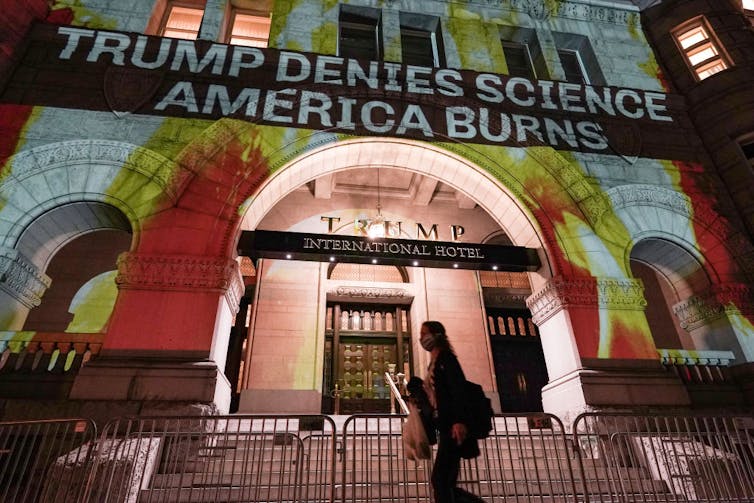A reversal in US climate policy will send renewables investors packing – and Australia can reap the benefits
- Written by The Conversation

President Donald Trump is trying to unravel the signature climate policy of his predecessor Joe Biden, the Inflation Reduction Act, as part of a sweeping bid to dismantle the United States’ climate ambition.
The Inflation Reduction Act, or IRA, is a A$530 billion suite of measures that aims to turbocharge clean energy investment and slash emissions in the US. Once hailed as a game-changer for the global clean energy transition, it set in train a fierce international competition for renewable energy investment.
But the policy is now hanging by a thread, after the US House of Representatives last month narrowly passed a bill to repeal many of its clean energy measures.
Should the bill pass the Senate, billions of dollars in renewables investment once destined for the US could be looking for a new home. Now is the time for the Albanese government to woo investors with a bolder program of climate action in Australia.
What is the Inflation Reduction Act?
The Inflation Reduction Act passed US Congress in 2022. It legislated billions of dollars in tax credits for solar panels, wind turbines, batteries and geothermal plants, among other technologies.
It included around A$13 billion in rebates for Americans to electrify their homes, tax credits of almost A$11,000 to electrify their cars, and billions more to establish a “green bank” and target agricultural emissions.
The money flowed. Last year, almost A$420 billion was invested in the manufacture and deployment of clean energy – double that in 2021, the year before the legislation passed.
Even in the first quarter of this year, under a Trump presidency, A$103 billion was invested in clean energy tech – an increase on the first quarter results of 2024. Electric vehicle manufacturing projects, especially batteries, were standout performers.
But then came the proposed repeal. The Trump administration wants to gut tax credits for clean energy technologies. The measures passed the House of Representatives and must now clear the US Senate, where the Republicans have a margin of three votes.
Initial modelling suggests the bill, if passed, could derail clean energy manufacturing in the US – including in Republican states where new projects were planned.
The potential economic damage has sparked concern even among Trump’s own troops. Some Republicans last week reportedly urged the scaling back of the cuts, despite voting for the bill in the House.
Opportunities for Australia
After the IRA was enacted, many countries followed the US’ lead – including Australia’s Albanese government, which legislated the A$22.7 billion Future Made in Australia package.
So how will Trump’s unravelling of the policy affect the rest of the world?
The economic impacts are still being modelled. Some studies suggest the US could cede A$123 billion in investment to other countries.
The US axing of tax credits for battery and solar technology paves the way for nations such as China and South Korea to capitalise – given, for example, they already dominate battery manufacturing.
Australia should be doing its utmost to attract investors that no longer see the US as an option. Our existing policies are a start, but they are not sufficient.
In February this year, Labor increased the investment capacity of the Clean Energy Finance Corporation – Australia’s “green bank” – by A$2 billion. But more will be needed if the government is serious about crowding-in private investment in low-emission technologies exiting the US.
The government would also be wise to remove incentives that increase fossil fuel use. This includes the diesel fuel rebate, which encourages the use of diesel-powered trucks on mine sites. Fortescue Metals this week announced a push for the subsidy to be wound back – potentially providing the political opening Labor needs.
What about nuclear?
Trump has also promised a “nuclear renaissance”, signing four executive orders designed to reinvigorate the US nuclear energy industry.
But those measures are likely to fail, just as Trump’s 2016 promise to revive the coal industry never eventuated.
In fact, his cuts to the Loan Programs Office – which helps finance new energy projects including nuclear – threaten to undermine the viability of new nuclear plants. The office has been the guarantor for every new US nuclear plant this century, bar one.
If the US is struggling to scale up its existing nuclear industry, this does not bode well for the technology’s hopes in Australia. Here, the prospect of a nuclear energy policy still appears alive in the Coalition party room, even though the technology remains politically unpopular, and the economics don’t stack up.
What’s next?
Predicting US climate and energy policy is a fool’s errand, given the potential IRA repeal, flip-flopping tariff announcements and daily social media tirades from Trump, including a social media bust-up with former ally Elon Musk over the merits of the repeal itself.
Stepping back from the politics, we cannot ignore the climate harms flowing from a walk-back on US climate action.
The US is the world’s second-largest emitter of greenhouse gases. As climate change reaches new extremes, the policy vacuum created by Donald Trump must urgently be filled by the rest of the world.







